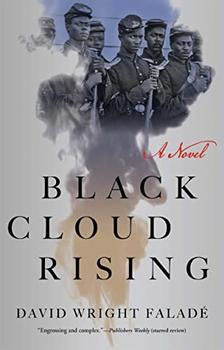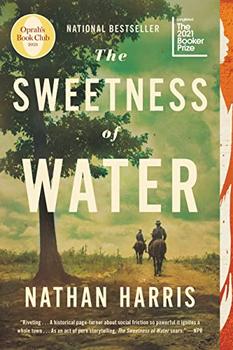Summary | Excerpt | Reading Guide | Reviews | Beyond the book | Read-Alikes | Genres & Themes | Author Bio

By late fall of 1863, the American Civil War was in its pivotal third year. Along the Virginia Tidewater region, Union forces were in control and pushing into eastern North Carolina, with a tentative toehold in the Outer Banks. Along with the soldiers of Abraham came emancipation for the enslaved and — for the men — the opportunity to sign up for the Union cause. In December, the newly formed African Brigade, under the command of fiery abolitionist, one-armed General Edward Augustus Wild, set out for a three-week raid to root out Confederate Partisan Rangers and free the remaining enslaved. Among them was Sergeant Richard Etheridge, the real-life historical figure and beating heart of David Wright Faladé's mesmerizing debut adult novel, Black Cloud Rising.
A complicated but fascinating figure, Etheridge is born a "Banker" (i.e., a native of Roanoke Island in the Outer Banks), the progeny of an enslaved mother, who is called Ma'am in the novel, and their enslaver, called John B. As Etheridge dons the Union blue and prepares to lead men into battle, he is beset by the ambivalent memories of his past and a sense of judgment from several intimate quarters: Fanny Aydlett, the love of his life whom he left behind to join the African Brigade; Sarah, his white half-sister who taught him to read and write but now disapproves of his decision to fight against the South; Patrick, the white cousin Richard grew up with whose volatile nature threatens to put them on opposing sides; and finally, a fellow soldier known simply as Revere, who holds a figurative mirror up to Richard's "mulatto" face. Battles begin quickly in Black Cloud Rising, but mostly in the haunted interior of Etheridge's mind:
"Among an isolated people, increasing your slave stock was as difficult as finding new blood for brides. Mulattoes were the result, open secrets. I stood as a model illustration, a 'scion' of the Etheridge House and broadly known as such, though a branch inscribed with my name would nowhere be found on the family tree."
Wright Faladé imagines this defining three-week expedition through Richard's eyes as he narrates the myriad events he witnesses, both humorous and horrifying. The desire of the formerly enslaved to prove their mettle in combat is amplified by the simultaneous need to locate and free family and friends still in the grip of their oppressors. When Richard's friend and squad leader, Corporal Fields Midgett, discovers two of his brothers are missing at his old homestead, he enlists Richard's help to find them. Richard finds his new position of leadership tested as he wrestles with the conflicting impulses to be an obedient Union soldier and to release his brothers and sisters in bondage.
The novel deftly pivots between the African Brigade's journey into hostile terrain and Richard's inner conflict and memories of a past littered with ambivalent feelings. Letters from his sister Sarah chide and anger him, but also leave him wistful for her warmth and plucky nature. News of his wayward cousin Patrick instills much more troubled feelings, as Richard recognizes Patrick's inability to admit their blood relation. When Sarah shares news of Patrick's involvement with Confederate guerilla forces in the area, a clarion call of reckoning sounds off in the novel. The biggest light in Richard's eyes is Fanny, whom he longs to return to after his enlistment ends. But will there be a future? Will he fall in battle before his life is truly lived? These are the human thoughts that Wright Faladé captures so skillfully, rendering a three-dimensional portrait of the Richard Etheridge of history.
Perhaps the most compelling subplot in Black Cloud Rising is the antagonism between Etheridge and Sergeant Revere. Both light-skinned Black men, Etheridge thinks Revere may harbor a similar parentage background as his own. But this is their only similarity, as Revere acts as the dismissive voice to Richard's upbringing among the white Etheridges. When Richard is elevated to Colonel Alonzo Draper's adjutant, Revere hisses to him with disdain:
"'Your proper place,' he whispered near my face, nodding toward the colonel, 'as a lackey and lickspit. Let the men, bona fide and proved, have at the mission of soldiering and emancipating.'"
In a novel full of reckonings, it is yet one more Etheridge will face before his narrative concludes.
Wright Faladé superbly crafts an authentic portrayal of the African Brigade and its harrowing experiences in 1863. Black Cloud Rising succeeds on every level as both history and historical fiction: evocative scenes, nuanced characters and taut writing convey powerful lessons about slavery, emancipation and Black identity. One will be the richer after reading this true story of the formerly powerless wielding weapons "primed with the percussion cap of memory."
![]() This review was originally published in The BookBrowse Review in February 2022, and has been updated for the
March 2023 edition.
Click here to go to this issue.
This review was originally published in The BookBrowse Review in February 2022, and has been updated for the
March 2023 edition.
Click here to go to this issue.

If you liked Black Cloud Rising, try these:

by Rachel Eliza Griffiths
Published 2024
Two Black sisters growing up in small-town New England fight to protect their home, their bodies, and their dreams as the Civil Rights Movement sweeps the nation in this "magical, magnificent novel" (Marlon James) from "a startlingly fresh voice" (Jacqueline Woodson).

by Nathan Harris
Published 2022
A profound debut about the unlikely bond between two freedmen who are brothers and the Georgia farmer whose alliance will alter their lives, and his, forever.
Your guide toexceptional books
BookBrowse seeks out and recommends the best in contemporary fiction and nonfiction—books that not only engage and entertain but also deepen our understanding of ourselves and the world around us.